UPSC Daily Current Affairs- 29th July 2023 | Current Affairs & Hindu Analysis: Daily, Weekly & Monthly PDF Download
GS-I
Persons with Disabilities (PWDs)
Subject: Society
Why in News?
The Parliamentary Standing Committee on Social Justice and Empowerment has called upon the Union government for failing to accurately estimate the population of Persons with Disabilities (PwDs).
About Persons with Disabilities (PWDs):
- As per United Nations Conventions on the Rights of Persons with Disabilities PWDs include those who have long-term physical, mental, intellectual or sensory impairments which in interaction with various barriers may hinder their full and effective participation in society on an equal basis with others.
- As per National Family Health Survey, India’s population of people with a disability has reduced to 1% between 2019 and 2021, from the 2.2% (26.8 million) estimated by the Indian census in 2011.
Constitutional Frameworks for Disabled in India:
- Article 41 of the Directive Principles of State Policy (DPSP) states that State shall make effective provision for securing right to work, to education and to public assistance in cases of unemployment, old age, sickness and disablement, within the limits of its economic capacity and development.
- The subject of ‘relief of the disabled and unemployable’ is specified in state list of the Seventh Schedule of the constitution.
Current status regarding Persons with Disabilities:
- In India, there were around 26.8 million persons with disabilities, constituting 2.21% of India’s total population (2011 Census).
- There were 14.9 million men (2.41% of men) and 11.9 million women (2.01% of women) with disabilities. 69% (18 million) of persons with disabilities reside in rural areas.
- 20% of persons with disabilities in India have a disability in movement, 19% have visual impairment, 19% have a hearing impairment and 8% have multiple disabilities.
- Disabilities are highest in the age group 10-19 years (46.2 lakh people).
- At an all India level, 34% of the total disabled population is reported as ‘workers’. The proportion is highest in Nagaland (~52%) followed by Sikkim (49%) and Arunachal Pradesh (~45%).
Rights of Persons with Disabilities Act 2016
- The Act replaces the Persons with Disabilities (Equal Opportunities, Protection of Rights and Full Participation) Act, 1995.
- It fulfils the obligations to the United National Convention on the Rights of Persons with Disabilities (UNCRPD), to which India is a signatory.
- Disability has been defined based on an evolving and dynamic concept.
- The types of disabilities covered are 21 and the Central Government has the power to add more types of disabilities.
- The Act provides for penalties for offences committed against persons with disabilities and violation of the provisions of the new law.
- Special Courts will be designated in each district to handle cases concerning the violation of the rights of PwDs.
Challenges faced by PWDs
- Social Stigma: The word disability is being seen as a social stigma, according to which parents feel ashamed of their children, and in fear, most of them feel uncomfortable in public upfront.
- Institutional Failures: Indian education system and Government institutions both are failing in deciding for the welfare for disabled persons to an extent.
- There should be proper seats for disabled persons at classrooms as well as at the exam centers.
- Illiteracy is particularly prevalent among disabled people and constitutes a double disadvantage. In addition to being disabled, they are isolated by illiteracy.
- Unemployment: Disabled persons are the ones who are scapegoats in being fired during recessions.
- They are first to be discharged from their services when cost cutting methods are adopted by the companies.
- Stress: The physically handicapped person is subjected to a lot of stress because of lack of social relations.
- In addition to increased physical and emotional stress, the crippled individual is condemned to a similar outcome in his social life.
Govt. schemes:
- Accessible India Campaign (Sugamya Bharat Abhiyan): Launched in 2015, this campaign aims to make public spaces, transportation, and information and communication technologies (ICT) accessible to PwDs.
- National Action Plan for Skill Development of Persons with Disabilities (NAP-SDP): This initiative focuses on enhancing the employability and skills of PwDs through vocational training, skill development programs, and creating inclusive employment opportunities.
- Deendayal Disabled Rehabilitation Scheme (DDRS): The scheme provides financial assistance for various rehabilitation services, including education, skill training, healthcare, and assistive devices, to economically disadvantaged PwDs.
- Scholarship Schemes: The government offers various scholarship schemes for PwDs to support their education and skill development.
- These include the National Scholarship Scheme for Persons with Disabilities and the Pre-Matric and Post-Matric Scholarship schemes.
- Accessible Education: The government has taken steps to promote inclusive education for PwDs, such as the Sarva Shiksha Abhiyan (SSA) and the Inclusive Education for Disabled at Secondary Stage (IEDSS) programs.
- Reservation in Government Jobs: PwDs are entitled to reservation in government jobs and public sector undertakings as per the provisions of the Rights of Persons with Disabilities Act.
Way Forward:
The Government has undertaken commendable initiatives for the welfare of the disabled and make them independent. However, they still face social exclusion driven by stigma and stereotypes about disability. The need of the hour is proper sensitization of the community towards the issues faced by PwDs, as well as to remove the social stigma attached to their integration into the society.
Source: The Hindu
Aravalli Range
Subject: Geography
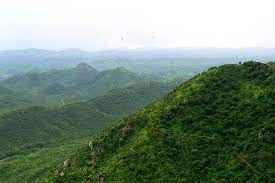
Why in News?
A seven-member team called the "Aravalli Rejuvenation Board" was recently formed to curb illegal mining in the protected Aravallis region.
About Aravalli Range:
- It is one of the oldest fold mountains of the world.
- It runs approximately 670 km (430 mi) in a south-west direction, starting near Delhi, passing through southern Haryana and Rajasthan, and ending in Gujarat.
- The highest peak is Guru Shikhar at 1,722 metres (5,650 ft). Guru is a peak in the Arbuda Mountains of Rajasthan.
- Rivers: Three major rivers and their tributaries flow from the Aravalli, namely Banas and Sahibi rivers which are tributaries of Yamuna, as well as Luni River which flows into the Rann of Kutch.
- Formation:
- It is part of the Aravalli-Delhi orogenic belt, which is a large and complex geological structure formed due to the collision of tectonic plates during the Proterozoic era.
- It is part of the Indian Shield that was formed from a series of cratonic collisions.
- In ancient times, Aravalli were extremely high but since have worn down almost completely by millions of years of weathering.
- The range is rich in mineral resources like copper, zinc, lead, and marble.
- It is divided into two sections: the Sambhar-Sirohi ranges, taller and including Guru Shikhar; and the Sambhar-Khetri ranges, consisting of three ridges that are discontinuous.
Source: The Hindu
Muharram and Ashura
Subject: Art and Culture
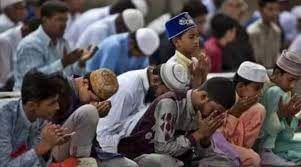
Why in News?
For the first time in over three decades, the Jammu and Kashmir government permitted a Muharram procession in Srinagar, drawing thousands of Shia mourners on the 8th of Muharram.
- The decision has been widely hailed.
What is Muharram?
- Muharram is the first month of the Islamic lunar calendar, and it holds significant religious and historical importance for Muslims worldwide.
- The word “Muharram” itself means “forbidden” in Arabic, signifying the sacred nature of this month.
- It is considered one of the four sacred months in Islam, during which warfare and conflicts are traditionally prohibited.
- It is observed by both Sunni and Shia Muslims (and even Hindus), though it holds different historical and religious significance for each group.
Celebration of Ashura
Ashura is the tenth day of Muharram and is the most significant day within the month.
- Shia Muslims: They commemorate the martyrdom of Prophet Mohammed’s grandson, Imam Hussain, who was killed in the Battle of Karbala in 680 AD. The prophet’s son-in-law, Ali, and Ali’s elder son, Hassan, are also remembered during this period as having suffered and died. On Ashura, Shia Muslims observe unique mourning rituals, including self-flagellation, chest-beating, and in some cases, forehead cutting using sharpened knives and chains with attached blades. ‘Taziya’, a tableaux procession is also held by the Shia Community.
- Sunni Muslims: Ashura marks the day when Prophet Moses and the Children of Israel were saved from Pharaoh’s tyranny by crossing the Red Sea.
- Hindu community: Some Hindus also observe Muharram by getting themselves painted in tiger stripes, visiting households and performing “huli kunita” as part of their “harake” (vow).
Ashura Celebration in Kashmir
- Ban under Dogra Rulers: During the reign of Dogra rulers, Muharram processions were either prohibited or allowed only at night, citing tensions between Shia and Sunni communities.
- 1920s: In the 1920s, despite the Dogra order for morning processions, mourners marched during the day, with both Shias and Sunnis joining the procession. This became associated with the Muslim freedom struggle in Kashmir.
- Selective Permits: Later, certain individuals and families were issued permits to take out processions, but the main Muharram procession was banned when militancy began.
Significance of allowing processions
- The permission for the Muharram procession in Srinagar after a long ban is a significant milestone, signifying progress towards religious freedom in the region.
- It emphasizes the need to respect the religious sentiments of the people and uphold the values of inclusivity and unity among different communities in the valley.
Source: The Hindu
GS-II
U.N. World Food Programme (WFP)
Subject: International Relations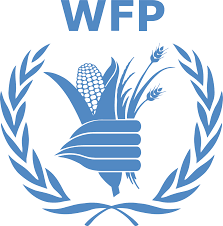
Why in News?
Deputy executive director of the World Food Program recently said that United Nations has been forced to cut food, cash payments and assistance to millions of people in many countries because of "a crippling funding crisis".
About U.N. World Food Programme (WFP):
- It is a branch of the United Nations that deals with hunger eradication and promotes food security in the world.
- WFP is the world’s largest humanitarian agency and was established in 1961.
- The organization's work is guided by Sustainable Development Goal 2, which aims to end hunger, achieve food security and improved nutrition, and promote sustainable agriculture by 2030.
- It operates in more than 120 countries, provides food assistance during emergencies and works with communities to enhance nutrition and generate resilience.
- Funding: WFP is funded by voluntary donations from governments, corporates and private donors.
- It is a member of the United Nations Development Programme (UNDP).
- Headquarters: Rome, Italy
- It has been functioning in India since 1963.
- It was awarded the Nobel Peace Prize in 2020.
- Report released by the WFP is Global Report on Food Crisis which describes the scale of acute hunger in the world.
Source: Money Control
Free Movement Regime along India-Myanmar Border
Subject: International Relations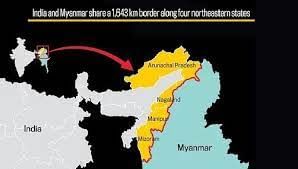
Why in News?
The ongoing ethnic conflict between the Meiteis and Kukis in Manipur is further complicated by the issue of illegal migration of tribal Kuki-Chin people into India from Myanmar.
- Amid this charged and sensitive debate, questions have been raised on the Free Movement Regime (FMR) that allows tribes along the Indo-Myanmar Border (IMB) to travel inside each other’s territory without a visa.
Understanding Free Movement Regime
- Conceptualization: The FMR was implemented in 2018 as part of the Act East policy to improve Indo-Myanmar ties.
- Travel permit: It allows tribes living along the IMB to travel up to 16 km into the other country without a visa.
- Ethnic and Cultural Ties: The border between India and Myanmar was demarcated without considering the opinions of the people living in the region, splitting people of the same ethnicity and culture into two nations.
- Significance: The FMR aimed to facilitate people-to-people contact, local trade, and business, essential for livelihoods and sustenance.
- Discontinuation: As the crisis in Myanmar unfolded, India suspended the FMR in September 2022.
Challenges created by FMR
- Unintentional Aiding of Illegal Immigration: The porous and unfenced Indo-Myanmar border has led to concerns about illegal immigration, drug trafficking, and gun running.
- Refugee influx: The military coup in Myanmar triggered persecution against the Kuki-Chin peoples, leading to a significant influx of Myanmarese tribals into Manipur and Mizoram, seeking shelter. Mizoram set up camps for over 40,000 refugees, despite protests from the Union Ministry of Home Affairs.
- Deforestation and Tensions: The Manipur government accused village chiefs of illegally settling migrants from Myanmar in new villages, leading to deforestation.
- Resistance to eviction: An eviction drive triggered violence between Kukis and the government.
Possible Solutions
- Better Regulation of FMR: Experts agree that the FMR needs better regulation to address the challenges arising from illegal activities and cross-border movements.
- Middle Path: A middle path could be sought, addressing changing socio-politico-economic conditions in Myanmar and the dynamic demographic profile of the region.
- Tackling the Issue: India needs to find an approach that balances addressing illicit activities and border crimes while considering the concerns and needs of the local population.
Conclusion
- The FMR along the Indo-Myanmar Border, although intended to foster people-to-people contact and local trade, has posed challenges related to illegal migration and illegal activities.
- While there are calls to remove the regime entirely, finding a middle path that considers the region’s socio-politico-economic dynamics and the well-being of the local population seems essential.
- Addressing these challenges will require a careful and balanced approach, reflecting the complexities of the situation on the ground.
Source: The Hindu
GS-III
International Tiger Day 2023
Subject: Environment and Ecology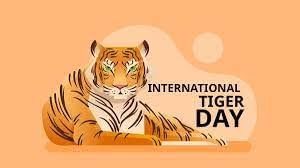
Why in News?
International Tiger Day is observed globally on July 29 every year.
About International Tiger Day:
- It is observed on July 29 each year.
- It serves as a platform to raise awareness about the endangered tiger species.
- It is celebrated worldwide to promote comprehensive efforts in safeguarding tigers and their natural habitats, fostering harmonious coexistence between humans and tigers.
- History of International Tiger Day:
- Global Tiger Day, commonly referred to as International Tiger Day, was first established in 2010 during the Saint Petersburg Tiger Summit by nations that are home to tigers.
- 13 tiger range countries came together to create Tx2 – the global goal to double the number of wild tigers by the year 2022.
- The 29th of July was chosen as International Tiger Day because it represents the halfway point between the first and last days of the Saint Petersburg Tiger Summit and the ongoing international campaign to rescue tigers.
Key Facts about Bengal Tiger:
- Bengal tiger (subspecies Panthera tigris tigris) inhibits the forests, and wetlands of India, Bangladesh, Bhutan, and Nepal.
- Features:
- It is distinguished from other tiger subspecies by its orange coat accented by prominent brownish-to-black stripes; a rare white-coated variant of the subspecies also exists.
- The largest male Bengal tigers can grow up to about 3.2 metres long (including a 1-metre-long tail) and weigh nearly 295 kg.
- Females are smaller, the largest ones measuring about 2.7 metres long and weighing as much as 181 kg.
- They are solitary hunters, preying primarily on ungulates(including deer and antelope), gaurs, and wild boars (Sus scrofa).
- Conservation Status:
- IUCN Red List: Endangered
- Wildlife (Protection) Act (WPA), 1972: Schedule-1
Source: Hindustan Times
Offer-for-Sale (OFS)
Subject: Indian Economy

Why in News?
The government’s stake sale in Rail Vikas Nigam Ltd (RVNL) through an offer-for-sale (OFS) received an enthusiastic response from institutional investors.
About Offer for Sale (OFS)
- OFS is a method of share sale introduced by India’s securities market regulator SEBI in 2012.
- The primary aim was to facilitate promoters of listed companies to reduce their holdings and comply with the minimum public shareholding norms within the stipulated time frame.
- This mechanism gained popularity among both state-run and private listed companies as a means to adhere to SEBI’s order.
- Subsequently, the government also embraced OFS to divest its shareholding in public sector enterprises.
Key Features of Offer for Sale:
- Stake Dilution: In an OFS, the promoters of a company reduce their stake by selling existing shares to retail investors, companies, Foreign Institutional Investors (FIIs), and Qualified Institutional Buyers (QIBs) through an exchange platform.
- Restriction on Fresh Issuance: Unlike a follow-on public offering (FPO), where companies can raise funds through issuing fresh shares or promoters can sell their existing stakes (or both), OFS is used exclusively for the sale of existing shares.
- Eligibility Criteria: Only promoters or shareholders holding more than 10% of the share capital in a company can conduct an OFS.
- Limited to Top 200 Companies: The OFS mechanism is available to the top 200 companies based on market capitalization.
- Reserved Quota for Institutions: A minimum of 25% of the shares offered in an OFS is reserved for mutual funds (MFs) and insurance companies. Additionally, no single bidder, other than MFs and insurance companies, can be allocated more than 25% of the offering size.
- Retail Investor Participation: A minimum of 10% of the offer size is reserved for retail investors, encouraging their participation in the share sale.
- Discount Provision: Sellers have the option to offer a discount to retail investors either on the bid price or on the final allotment price.
- Timely Notification: The company must inform the stock exchanges about its intention to conduct an OFS at least two banking days prior to the event.
Source: Indian Express
Pedicularis Revealiana
Subject: Environment and Ecology
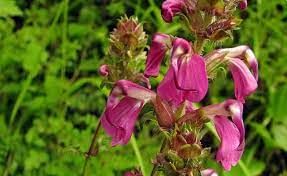
Why in News?
Recently, scientists from the Botanical Survey of India (BSI) Prayagraj Centre have discovered a new plant species Pedicularis Revealiana, in the state of Sikkim.
About Pedicularis Revealiana:
- It is unique among all Pedicularis species.
- It is stout and woody stems, bears minute flowers of pinkish-purple colour.
- It is a hemiparasitic plant species.
- Along with making its own food, it has the ability to gather nutrients from the roots of trees and plants located nearby.
- This new flora is found in remote forests, which are covered with snow for most of the year.
- This genus includes about 677 species worldwide, of which 82 species, 13 subspecies and nine varieties have been reported so far in India.
- Pendicularis revealiana is the 83rd species reported by the botanists and the plant is commonly known as a perennial herb.
Key Facts about Botanical Survey of India
- It is the apex taxonomic research organization of the country which is under the Ministry of Environment, Forest & Climate Change, Government of India.
- It was established on 13thFebruary 1890 under the direction of Sir George King.
- The mandate of the organization has been broadened to biosystematics research, floristic studies, documentation, databasing of National Botanical collection, digitization of herbarium specimens etc.
- Headquarter: Kolkata
Source: Times of India
|
38 videos|5275 docs|1115 tests
|





















